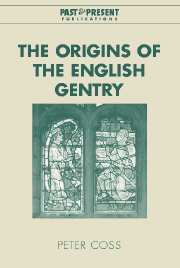Book contents
- Frontmatter
- Contents
- List of illustrations
- Preface
- 1 The formation of the English gentry
- 2 The roots of the English gentry
- 3 The Angevin legacy: knights as jurors and as agents of the state in the reign of Henry III
- 4 The crisis of the knightly class revisited
- 5 Knights in politics: minor landowners and the state in the reign of Henry III
- 6 Knighthood, justice and the early Edwardian polity
- 7 The explosion of commissions and its consequences
- 8 Identity and the gentry
- 9 Knights, esquires and the origins of social gradation in England
- 10 Crystallisation: the emergence of the gentry
- Appendices
- Bibliography
- Index
- Past and Present Publications
Preface
Published online by Cambridge University Press: 10 December 2009
- Frontmatter
- Contents
- List of illustrations
- Preface
- 1 The formation of the English gentry
- 2 The roots of the English gentry
- 3 The Angevin legacy: knights as jurors and as agents of the state in the reign of Henry III
- 4 The crisis of the knightly class revisited
- 5 Knights in politics: minor landowners and the state in the reign of Henry III
- 6 Knighthood, justice and the early Edwardian polity
- 7 The explosion of commissions and its consequences
- 8 Identity and the gentry
- 9 Knights, esquires and the origins of social gradation in England
- 10 Crystallisation: the emergence of the gentry
- Appendices
- Bibliography
- Index
- Past and Present Publications
Summary
The Origins of the English Gentry stems directly from an essay published in Past and Present 147 (May 1995), entitled ‘The Formation of the English Gentry’. In this essay I lamented the lack of conceptual rigour in the use of the term ‘gentry’ and offered a six-point definition. I argued, further, that the gentry was formed in ‘an accelerating process’ between the mid-thirteenth and the mid-fourteenth century. What follows is essentially an amplification of that study. The amplification is required because some of the issues were dealt with rather cursorily there and require a more extended treatment than I was able to give them at that time. I have been especially conscious that the process of gentry formation has not only to be described but to be fully explained. This could only be done in an extended study. In developing and refining my argument, moreover, I have also been able to take account of some important work that has been published during the intervening years.
My principal concern throughout the book has been to understand the origins of the gentry. It is intended, therefore, not as a history of the gentry per se, but as a contribution to that history. Of necessity, I have restricted my chronology and concentrated on the issues I consider central. I have approached the subject historiographically so that the reader can appreciate where my interpretation diverges from other, often more traditional, expositions.
- Type
- Chapter
- Information
- The Origins of the English Gentry , pp. xi - xiiPublisher: Cambridge University PressPrint publication year: 2003

